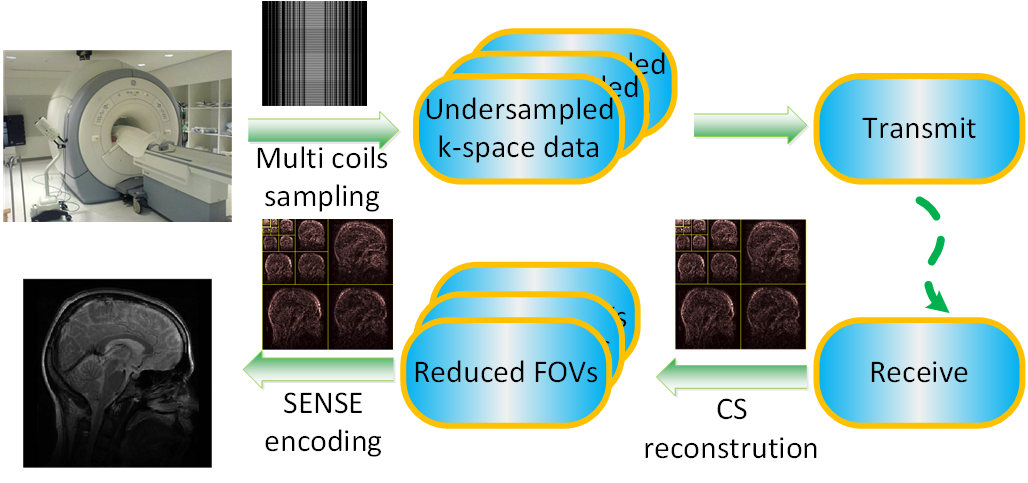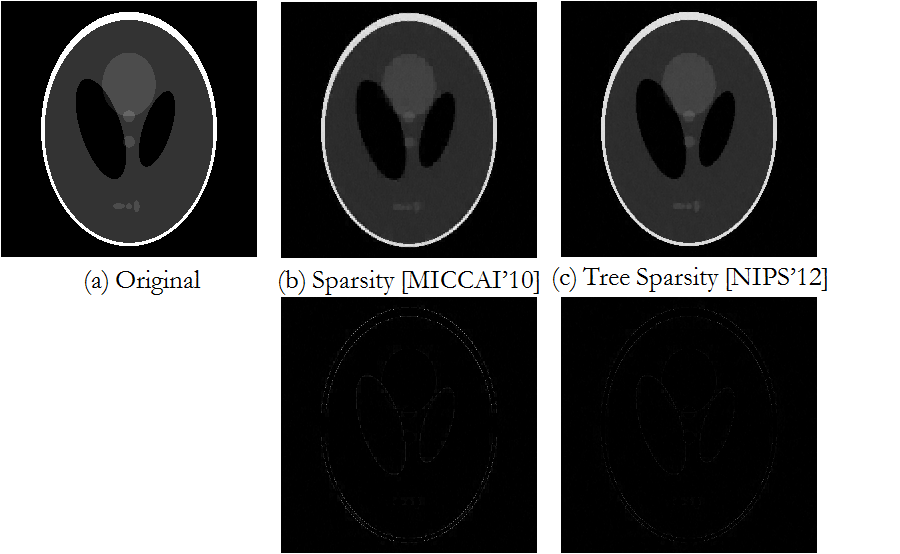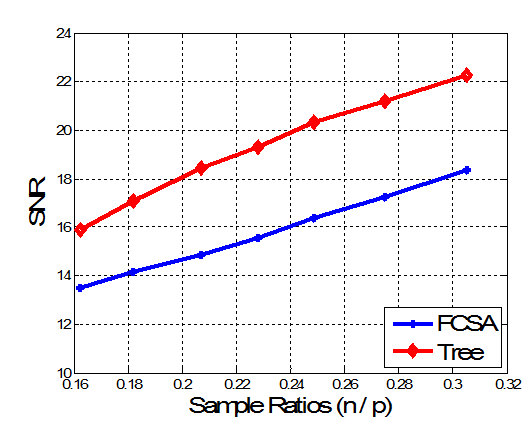.Introduction
Compressed sensing (CS) aims to reconstruct signals and images from significantly fewer measurements than were traditionally thought necessary. Magnetic Resonance Imaging (MRI) is an essential medical imaging tool burdened by an inherently slow data acquisition process. The application of CS to MRI has the potential for significant scan time reductions, with benefits for patients and health care.In Compressive Sensing Magnetic Resonance Imaging (CS-MRI), one can reconstruct a MR image with good quality from only a small number of measurements. This can significantly reduce MR scanning time. According to our proposed structured sparsity theory, the measurements can be further reduced to O(K + log n) for tree-sparse data instead of O(K + K log n) for standard K-sparse data with length n. However, few of existing algorithms have utilized this for CS-MRI, while most of them model the problem with total variation and wavelet sparse regularization. On the other side, some algorithms have been proposed for tree sparse regularization, but few of them have validated the benefit of wavelet tree structure in CS-MRI. In this work, we propose a fast convex optimization algorithm to improve CS-MRI. Wavelet sparsity, gradient sparsity and tree sparsity are all considered in our model for real MR images. The original complex problem is decomposed into three simpler subproblems then each of the subproblems can be efficiently solved with an iterative scheme. Numerous experiments have been conducted and show that the proposed algorithm outperforms the state-of-the-art CS-MRI algorithms, and gain better reconstructions results on real MR images than general tree based solvers or algorithms.
.Publications
-
Zheng Xu, Sheng Wang, Yeqing Li, Feiyun Zhu and Junzhou Huang, "PRIM: An Efficient Preconditioning Iterative Reweighted Least Squares Method for Parallel Brain MRI Reconstruction", Neuroinformatics, Volume 16, Issue 3-4, pp. 425-430, October 2018. [CODE]
- Chen Chen, Lei He, Hongsheng Li and Junzhou Huang, "Fast Iteratively Reweighted Least Squares Algorithms for Analysis-Based Sparse Reconstruction", Medical Image Analysis, Volume 49, pp.141-152, October 2018. [CODE]
- Jiawen Yao, Zheng Xu, Xiaolei Huang and Junzhou Huang, “An Efficient Algorithm for Dynamic MRI Using Low-rank and Total Variation Regularization”, Medical Image Analysis, Volume 44, pp. 14-27, February 2018. [CODE]
-
Chen Chen, Yeqing Li, Leon Axel and Junzhou Huang, “Real Time Dynamic MRI by Exploiting Spatial and Temporal Sparsity”, Magnetic Resonance Imaging, Volume 34, Issue 4, pp. 473-482, May 2016. [CODE]
- Zhongxing Peng, Zheng Xu, Junzhou Huang, "RSPIRiT: Robust Self-Consistent Parallel Imaging Reconstruction Based on Generalized Lasso", In Proc. of The International Symposium on Biomedical Imaging, ISBI'16, Prague, Czech Republic, April 2016.
-
Zheng Xu, Yeqing Li, Leon Axel, Junzhou Huang, "Efficient Preconditioning in Joint Total Variation Regularized Parallel MRI Reconstruction", In Proc. of the 18th Annual International Conference on Medical Image Computing and Computer Assisted Intervention, MICCAI'15, Munich, Germany, October 2015. [CODE]
-
Ruoyu Li, Yeqing Li, Ruogu Fang, Shaoting Zhang, Hao Pan, Junzhou Huang, "Fast Preconditioning for Accelerated Multi-Contrast MRI Reconstruction", In Proc. of the 18th Annual International Conference on Medical Image Computing and Computer Assisted Intervention, MICCAI'15, Munich, Germany, October 2015. (Oral Presentation)
-
Jiawen Yao, Zheng Xu, Xiaolei Huang, Junzhou Huang, "Accelerated Dynamic MRI Reconstruction with Total Variation and Nuclear Norm Regularization", In Proc. of the 18th Annual International Conference on Medical Image Computing and Computer Assisted Intervention, MICCAI'15, Munich, Germany, October 2015. [CODE]
-
Junzhou Huang, Chen Chen, Leon Axel, "Fast Multi-contrast MRI Reconstruction", Magnetic Resonance Imaging, Volume 32, Issue 10, pp. 1344–1352, December 2014. [CODE]
-
Chen Chen and Junzhou Huang, ”Exploiting the wavelet structure in Compressed Sensing MRI”, Magnetic Resonance Imaging, Volume 32,Issue 10, pp. 1377–1389, December 2014. [CODE]
-
Chen Chen and Junzhou Huang, "The Benefit of Tree Sparsity in Accelerated MRI", Medical Image Analysis, Volume 18, Issue 6, pp. 834–842, August 2014. [CODE]
-
Chen Chen, Yeqing Li, and Junzhou Huang, "Forest Sparsity for Multi-channel Compressive Sensing", IEEE Transactions on Signal Processing, Volume 62, Issue 11, pp. 2803-2813, June 2014. [CODE]
-
Chen Chen, Yeqing Li, Leon Axel and Junzhou Huang, “Real Time Dynamic MRI with Dynamic Total Variation”, In Proc. of the 16th Annual International Conference on Medical Image Computing and Computer Assisted Intervention, MICCAI'14, Boston, USA, September 2014. [CODE]
-
Chen Chen, Yeqing Li, and Junzhou Huang, "Calibrationless Parallel MRI with Joint Total Variation Regularization", In Proc. of the 16th Annual International Conf. on Medical Image Computing and Computer Assisted Intervention, MICCAI'13, Nagoya, Japan, September 2013. [CODE]
-
Chen Chen and Junzhou Huang, "Compressive Sensing MRI with Wavelet Tree Sparsity", In Proc. of the 26th Annual Conference on Neural Information Processing Systems, NIPS'12, Nevada, USA, December 2012. [PDF] [CODE]
-
Chen Chen, Junzhou Huang and Leon Axel, ''Accelerated Parallel Magnetic Resonance Imaging with Joint Gradient and Wavelet Sparsity'', MICCAI Workshop on Sparsity Techniques in Medical Imaging, Nice, France, October 2012. [PDF]
-
Chen Chen and Junzhou Huang, "The Benefit of Tree Sparsity in Accelerated MRI", MICCAI Workshop on Sparsity Techniques in Medical Imaging, Nice, France, October 2012. [PDF] (Best Paper Award)
-
Junzhou Huang, Shaoting Zhang, Dimitris Metaxas, "Efficient MR Image Reconstruction for Compressed MR Imaging", Medical Image Analysis, Volume 15, Issue 5, pp. 670-679, October 2011. [CODE]
-
Junzhou Huang, Shaoting Zhang and Dimitris Metaxas, "Efficient MR Image Reconstruction for Compressed MR Imaging ", In Proc. of the 13th Annual International Conf. on Medical Image Computing and Computer Assisted Intervention, MICCAI’2010, Beijing, China, September 2010.. [PDF] [SLIDES] [CODE] [Supplemental] (MICCAI Young Scientist Award)
Notice: The codes was tested on Windows and MATLAB 2008. If you have any suggestions or you have found a bug, please contact us via email at jzhuang@uta.edu
Compressive Sensing Magnetic Resonance Imaging
 |
Figure. The Flowchart of Compressed Sensing Magnetic Resonance Imaging |
Visual Comparison
 |
Figure.
Comparisons on Phantom Image (Sparsity
vs. Tree Sparsity). (a) Orignal Image; (b) Reconstructed Image
with wavelet sparisty (14.7 db); (c) Reconstructed Image with
wavelet tree sparsity (18.3 db); (c) and (d) residuals compared
with the original image |
 |
Figure.
Comparisons on Phantom Image (Sparsity
vs. Tree Sparsity). The blue color denotes the sparsity based
reconstruction and the red color denotes the tree sparsity
based reconstruction |
Related Sources
[1] SparseMRI
[2] TVMRI
[3] RecPF